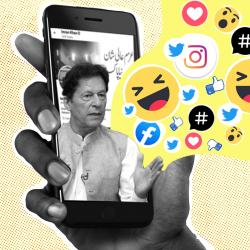
Almost half a century ago, Ghita Ionescu and Ernest Gellner perceived populism as ‘a spectre haunting the world.’ Some 50 years later, political analysts and academics are still treading the surface of a very slippery concept as populism is on the rise across the world and so is the use and misuse of social media by populist leaders.
Populist leaders thrive on social media. Famous cricketer-turned-politician and Pakistan’s former Prime Minister Imran Khan is one such name in a long list of populist leaders around the world who have extensively used social media to spread their political ideology, transnationally. In 2013, Khan’s political party Pakistan Tehreek-i-Insaaf (PTI) was the first party in the country to tap the social media market and employ its election campaigns. In 2018 elections, PTI digital media cells, notoriously linked to launching coordinated and organised anti-opposition hate and propaganda campaigns both inside Pakistan and overseas, had grown in numbers and influence. As a prime minister, Khan regularly addressed the nation by going live and taking calls ‘to listen to his citizens’. By 2019, not only was Khan the sixth most popular world leader on Twitter, his Instagram account was also the second most active government account in the world. Following his ouster last Sunday, the Twitter hashtag that he is promoting against the newly formed government surpassed 8 million retweets within days.
In 2021, his digital media team was accused of running smear campaigns against women journalists who questioned the government’s policies on several matters, including domestic violence, irregularities in controlling the COVID-19 pandemic, and the controversial Pakistan Electronic Crimes Act (PECA) 2016, which already has the country’s journalists and human rights activists concerned as they fear the draconian cybercrime law may curtail media freedom and any criticism of the government can be treated as a crime.
As a populist leader, Khan perceives his environment as filled with conspiracies that are all designed to take him down only. His mindset manifests on social media as manipulation of his followers, who are enabled to resort to abusive rhetoric until the conspiracy is either foiled or Khan emerges as the true saviour of the nation. It is no secret that Khan instructs his digital media team on the narrative he wants to spread online, the issues he wants to highlight and those he wants to block out from the public eye. Following his political rhetoric of negativism, absolutism and colloquialism, his followers reflect the same narrative and tone in their social media repertoires creating a deep-rooted polarisation in the socio-political public sphere.
Populism manifests in real life and on social media in different ways, and the [mis]use of social media by populist leaders, especially in authoritarian democracies such as Pakistan, has already done much harm to democracy and liberal political ideology of the society at large.

Ayesha Jehangir

